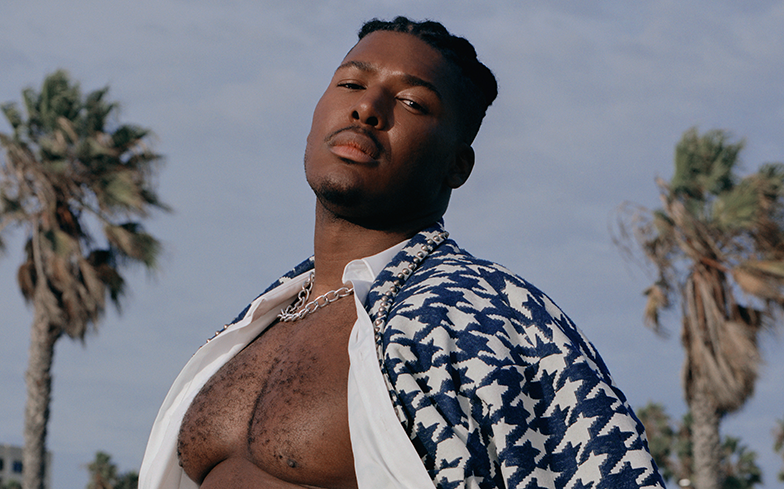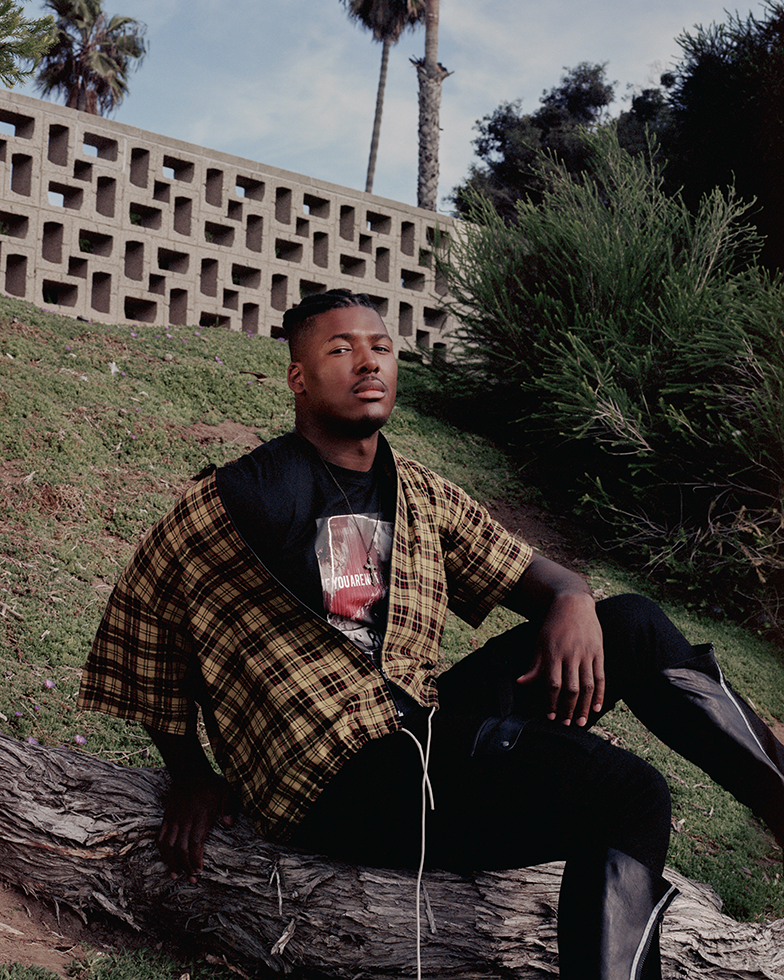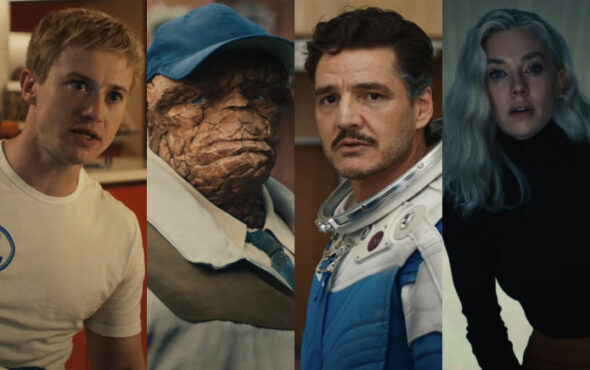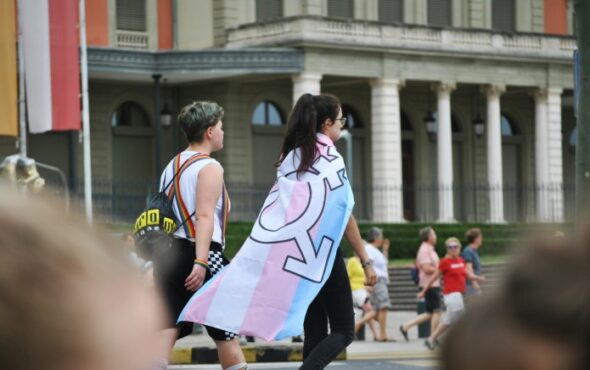
The NFL has its first queer role model – and he’s here to change the game for good.
As queer people, we have no choice but to be brave. In a world that challenges LGBTQ identities and narratives, just being ourselves openly and honestly can come with a certain amount of risk compared to our heterosexual counterparts. But imagine that in the hyper-masculine world of the NFL at the professional level, entering a space where no openly queer person has done so at that stage of their career before. When Ryan Russell decided to come out publicly as bisexual in an essay for ESPN at the end of August, he found himself treading new ground. Many of us would consider it a significant act of bravery and strength, but that was far from the motive in Ryan’s mind. “I know at the time of coming out I was more focused on my own survival,” he tells us from Los Angeles. “I was in a position where I was trying out for a team, and things were going really well, and I was on the brink of being finalised for that team. But then I thought about what that would mean for me in my personal life, what that would mean on my own journey of self-discovery and development and self-love. And it felt suffocating, it felt regressive, it felt harmful and I never wanted achieving my dreams to feel that way. I never wanted living out my dream of playing in the NFL and being back on a team to feel like any of those things.”
I’m speaking to Ryan Russell not only as GAY TIMES’ latest cover star but also as the recipient of the GAY TIMES Honour for Sporting Hero. Let us not overlook just how tremendous Ryan’s coming out essay was back in August. At the time he not only became the only openly queer player at the professional level of American football but also the only openly LGBTQ athlete across all major professional leagues in the US. Even here in the UK, we have no openly queer male players who are currently active in the Premier League. Ryan is currently a free agent which, for those not familiar with the term, means he freely available to sign to any club or franchise. With a career history of playing with the Dallas Cowboys and Tampa Bay Buccaneers, his prospects are incredibly bright.

But in order to become the very best player he could be, Ryan knew he needed to live an open life. “When I made the decision to come out, it felt necessary, it felt necessary for breathing, it felt like survival,” he says. “And I was thinking of combining these two worlds, about combining my dreams, and about combining my love for myself and who I am, and the whole of who I am, and living in that and finally having the full spectrum of happiness.” He pauses. “I will say, now, having been out for the time that I have, I might not have known the weight I was carrying on my shoulders until I unpacked it and finally let it go because all the relief and the calm and the love and the support that I feel now is unmatched. It’s beyond any expectations I could have possibly had. I was hoping for it to be a positive experience, but now I’m realising it was a life-changing and a life-saving experience.”
Ryan’s personal journey to this moment wasn’t an easy one. Just over a year ago he mourned the tragic passing of his best friend Joseph Gilliam who, at just the age of 27, was diagnosed with stage four cancer. Ryan was with him when he was diagnosed and remained by his side throughout the battle. Understandably, it gave him a fresh perspective on life. “When he passed, I realised he’s not only my best friend but my mentor. He had known about my sexuality, he’d known about everything that I’d gone through in my life, and he was one of the best people that I’ve ever met. And for someone so loving and promising and so fierce to leave the world so early was a wake-up call for me. It was the moment where I really understood how short and how precious life was. It didn’t matter whether you were a good person, it didn’t matter whether you were closeted or out, it didn’t matter whether you are an athlete or a musician. I realised I had kind of been living a half-life or two lives that had never really met.”

As a response to that realisation, he moved to Los Angeles despite having “little to no family, really no friends” there. Having visited the Californian city a few times he did, however, have a sense of feeling at home there. His motivation was reinvigorated, he started dating “openly and honestly” and he even spent more time focussing on his poetry, and in turn had his work published. Prison and Passion chronicles his journey and is a selection of the more than 300 poems he had written in private. “I just never thought under my name would be ‘NFL player, poet-writer’,” he remarks. Los Angeles afforded him the opportunity to develop his multifaceted nature. “I was feeling things for myself outside of football that were fulfilling my soul and fulfilling all these gifts and talents and wanton desires that I hadn’t focussed on before,” he explains.
While the year out from football was to recover from a shoulder injury, it also helped him to rebuild other aspects of his life outside of the sport. “Being an NFL veteran, I was confident in my ability to get my body and my mind game ready, so it was good that I had already established that groundwork,” he says. “I got into a relationship, the strongest, most positive, most caring relationship that I’ve ever been in and it was fate; knowing that I could be honest with someone and be upfront with someone and really build a kind of relationship deeper than anything I’d had before. All of these things came together to create, not just the want to come out, but a need to come out. I need to keep this part of my life, and this part of my soul, that I’ve now enriched and now I’d started fulfilling. I needed to keep this, I needed to protect this, I needed to survive this with a huge part of who I am and my happiness – as is football. So when I got the call to try out for a team, I thought for a second I would have to climb back into the closet and to put a cross through all that, and it was unbearable.”

That single-second thought was quickly dashed, and by the end of August, Ryan Russell was ready to live openly in public as he had been in private. But as we all know, coming out is just the start of a much longer voyage. “It’s been tough, it’s been challenging,” Ryan admits when I bring up the process of stripping away the shame queer people are forced to endure as closeted individuals in a heteronormative world. “Even having a relationship now, that I would deem very positive, loving, caring and healthy, I still have to work at that. I have to work on my friendships even, my everyday life. I’ve become accustomed to telling half-truths and not feeding them lies. You know, giving people the parts of me that I knew that they would like, ‘professional football player’ or this and that, instead of just giving people the whole truth. And that’s what I’m encouraged to do now, as this is who I am. And it comes back to self-love really. I know that even with my shortcomings, even with my faults, even with my different views from other people, I am still a human being that deserves love. I’m still a human being who has a value outside of anything that I do. I know my worth, and I know my value now, and I embrace that.”
Living at the intersection of their identity comes with its own set of challenges for queer people of colour, but for Ryan, he is also at risk of facing further discrimination as someone who identifies as bisexual. We’ve come some way from the days where people ignorantly considered bisexuality as a stepping stone towards homosexuality, or wrongly demonised bisexual people as “greedy” for having a larger crowd to pick from. But sadly, bi-erasure is still commonplace, and the bisexual identity is widely misunderstood and invalidated by those not willing to accept its existence. That happens both in and outside the community. Ryan hasn’t been immune to those views, telling us he’s aware that people would remark that he identifies as bisexual because he’s “ashamed to say I’m gay” or that he is “trying to hold onto a part that I thought was more masculine”. There’s also the line that people would say he identifies as bi because it is “more palatable”.

“Anyone who is bisexual and is an out bisexual individual can tell you that being bisexual is definitely not more palatable,” he says. “There’s a kind of stigma at both ends; that I’m not straight enough, or I’m not gay enough – that type of mentality that I think is misconstrued and put out into the world. I don’t even think it’s the majority, just a small vocal part who believe that. I feel very grateful to be part of the LGBTQ community and for people to know that and to see that and to just embrace that and my experience. Coming out now, I see that there’s so much work to be done. There’s so much work to be done when it comes to all queer folk. So me being bisexual, I feel the call to bring awareness on both ends, both within and outside of the community on bisexuality and what it really means. It’s not a question of commitment or a question of transition or confusion, like none of the other letters in the LGBTQ acronym. So, personally now all my experiences have been positive and warm and loving, and my journey to getting to this place of being bisexual was something that was a little more complex.”
Now that he’s arrived at this peace with his identity, Ryan’s openness to be honest about his sexuality as a promising NFL star on the rise places him as a pioneer in the sport. As we mentioned earlier, never before has the sport had an openly queer player at this level. David Kopay was the first major pro who had a career playing in the NFL to come out back in 1975, but that was after he retired. Again, Jeff Rohrer came out long after he retired from the sport, and tied the knot with his husband just last year. Then there was Michael Sam who, back in 2013, came out as gay following his college football career, but never managed to get an NFL game under his belt. There have been very few openly LGBTQ role models in the game, so how can the NFL make players feel like they’re better supported to feel like they can come out?

“I believe that it starts with a ladder of great changes and movements and I think that’s started,” Ryan says. “I think it starts not just from the top down, but that everyone has a part in it, from players to staff to fans. I think that it’s definitely something that needs to be attacked on all levels. Coming out is personal, and I never want to lose my goal of the individual’s well-being, with the mantle of the good of the team or the good of inclusion and visibility. I think it starts with a conversation, I think it starts with visibility, which is something I’m trying to accomplish and work on now. I think it starts with having that conversation and representation is huge. I know the first time I ever saw as a young boy, a male black lead actor, I thought I could act. Seeing something is powerful. I mean there’s a reason that Instagram and social media and YouTube and all these visual things have so much success. We feel as though sight and visibility and representation gives us hope and it builds the confidence within us. If someone from where I came from, who looks like me, or believes what I believe, or loves who I love, it’s a power. The world feeds off of each other, there’s a reason why there’s almost eight billion of us in the world. Because we are ready to build off each other and to love each other and to just bring each other up. And I think that’s the same in sport, and I think that’s the same with LGBTQ individuals and LGBTQ athletes.”
Ryan Russell has come a long way in 2019, and 2020 is shaping up to become yet another monumental year for the athlete. He’s in great physical shape, with his sights firmly set on playing in the NFL once again. He’s also writing his memoir, which he describes as a “terrifying but exciting” experience. Then there’s the opportunity to travel, living as his authentic self and by doing so inspiring a generation of LGBTQ sports people. “I’m not going to sit up here and say that I was thinking about changing the world, the decision to come out was very much me wanting to breathe and to wake up and look in the mirror and be proud of who I saw looking back at me,” he says. “But I had hopes that my story could help a young athlete, someone that had the same questions I had and had the same worries that I had in the back of my mind.” There’s little doubt those hopes have already been realised.
Photography Ryan Pfluger
Fashion Lateef Abdullah
Words Lewis Corner
Grooming Amber Amos



